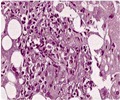New research shows infants who have recurrent fevers are less likely to develop allergies later in childhood.
New research shows infants who have recurrent fevers are less likely to develop allergies later in childhood.
Researchers from the National Institutes of Health studied more than 830 children from birth to age 1 year and documented all fever-related episodes. Researchers defined fever as a temperature of 101 degrees Fahrenheit or higher. Half the children were evaluated again for allergies when they were between ages 6 and 7. Researchers tested the children for sensitivity to allergens such as dust mites, ragweed and cats.Results show 50 percent of children who did not experience fevers had allergies at age 6 or 7. Nearly 47 percent of children who experienced one fever before age 1, became allergy-prone. However, only about 30 percent of children who suffered from two or more fevers as infants developed allergies. Specifically, researchers say fever-inducing infections involving the eyes, ears, nose or throat were associated with a lower risk of developing allergies .It also was interesting that the more fevers an infant had, the less likely it was that he or she would be sensitive to allergies.
Researchers say this study supports the hygiene hypothesis, which contends that early exposure to infections might protect children against allergic diseases later in life. The findings of this study strengthen the hypothesis and, after more research, could lead to preventative therapies for asthma and allergies.
Researchers say they are working on another study to determine if early exposure to pets, as well as high levels of bacteria, could lower allergy risk. Researchers also say that if they can determine which environmental factors affect allergic development and why, it may be possible to immunize children against those conditions.











